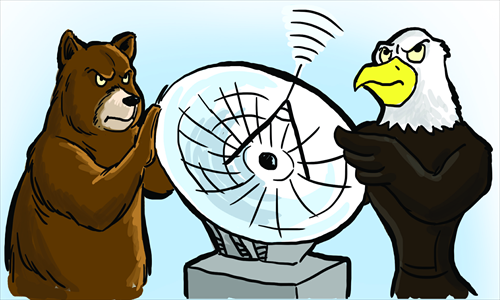Russia and US can drop Cold War attitude to missile defense

Despite the "reset" of relations between the US and Russia, friction between Washington and Moscow has been mounting of late. The Obama administration is justifiably angry over the Kremlin's alignment with the Syrian regime. Moscow is right to be upset that the US Congress has yet to repeal economic sanctions left over from the Cold War, despite the fact that Russia joined the WTO on August 22. These recent developments take place against the backdrop of a continuing disagreement over NATO's plans for missile defense, perhaps the most serious cloud over future US-Russian relations.
The dispute over missile defense is not, however, an insurmountable obstacle to rapprochement between Moscow and Washington.
Indeed, both Russia and the US have a common interest in building a shield against potential threats from Iran. But mutual suspicion impairs their ability to act on this shared interest.
The task ahead is to pursue cooperation on other issues, over time nurturing the mutual trust needed to clear the way for collaboration on missile defense.
Soon after taking office, US President Barack Obama revamped former president George W. Bush's plans for deploying interceptors in Europe that would be capable of shooting down missiles launched from Iran. Instead, Obama adopted a phased approach, first relying on ship-based interceptors in the Mediterranean better equipped to deal with the immediate Iranian threat and then, beginning in 2015, deploying land-based radar and interceptors in Europe.
The Kremlin welcomed the new plan at first, while Poland and the Czech Republic, the countries ready to host Bush's system, were disgruntled.
But Moscow has since renewed its objections, claiming that deploying radar and interceptors in Europe would threaten its nuclear deterrent. Meanwhile, NATO members have collectively endorsed the plan, which is moving ahead.
NATO's evolving missile defense system is targeted specifically against Iran. It is limited in scope and thus poses no threat to Russia's robust nuclear deterrent. The Kremlin's staunch opposition to the system thus reflects the continuing distrust that characterizes relations between the US/NATO and Russia.
That distrust is in part a hangover from the Cold War, a legacy made more potent by the readiness of both Russian and American politicians to whip up rivalry for domestic political purposes. Putin regularly deploys anti-American rhetoric to shore up domestic support and Republican presidential candidate Mitt Romney has bizarrely identified Russia as the primary foe of the US.
But the distrust is the product not just of political posturing on both sides. Moscow remains disgruntled over NATO's eastward expansion as well as the alliance's toppling of the Qaddafi regime in Libya.
Washington is upset not only with Moscow's stance on Syria, but also its recognition of and military presence in Georgia's breakaway regions of Abkhazia and South Ossetia and its repression of domestic dissent.
These contentious issues provide the backdrop against which NATO's missile defense system is viewed by Moscow as a threat rather than a defensive capability from which it could benefit.
Accordingly, the US and its NATO partners should redouble efforts to cooperate with Russia on a host of different fronts, in so doing cultivating the mutual confidence that could ultimately lead to a breakthrough on missile defense.
As they did after Obama first came into office, Washington and Moscow should focus on what unites them, not on their differences. With Russia now in the WTO, deeper commercial ties are in the offing.
The New Start Treaty has already been ratified, potentially clearing the way for further progress on arms control. Washington and Moscow share an interest in helping Afghanistan find its way to stability. And they both strongly oppose Iran's acquisition of a nuclear weapon.
Capitalizing on these commonalities offers Russia and the US an opportunity to put their relationship on a more cooperative foundation, thereby enabling them to tackle more divisive issues. And once the election season has passed in both countries, Putin and either Obama or Romney will have more room for maneuver on the home front.
Ultimately, NATO and Russia need to be partners, not rivals, when it comes to missile defense. That means tying Russia's own missile defense capabilities into the evolving NATO system, ensuring that Moscow sees itself as a stakeholder in, not an object of, NATO's efforts.
There are technological as well as political hurdles to such cooperation. But by steadily working together on other issues and extending the zone of common ground, Moscow and Washington should be able to find their way to partnership on missile defense as well.
The author is professor of international affairs at Georgetown University and senior fellow at the Council on Foreign Relations. His most recent book, No One's World: The West, the Rising Rest, and the Coming Global Turn, will be published in Chinese this fall. opinion@globaltimes.com.cn